Tommy Tuberville welcomes Nikki Haley to 2024 presidential race
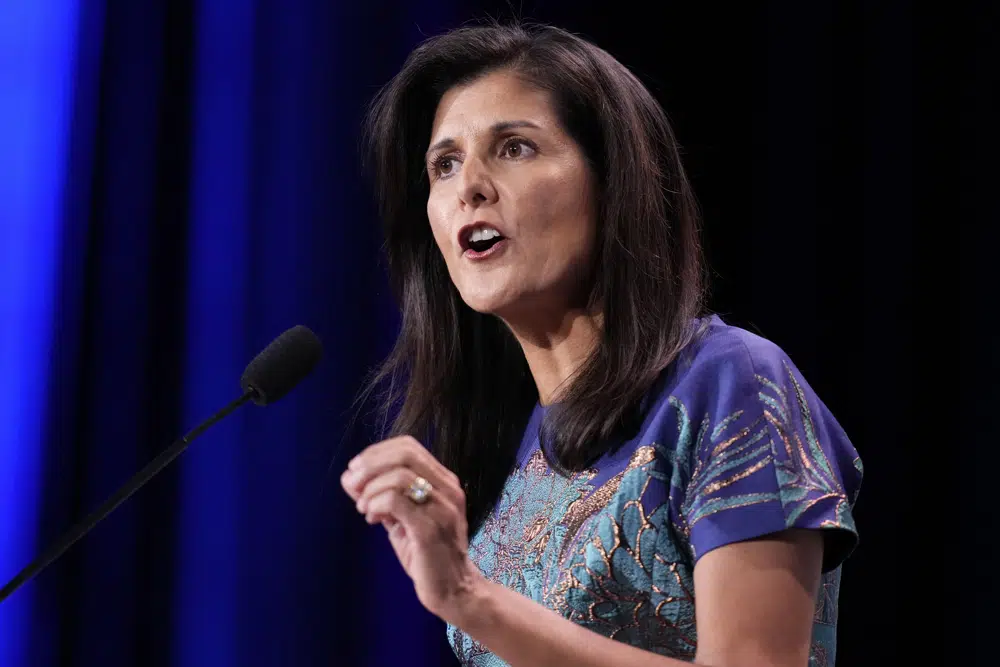
On Monday, former South Carolina Governor and UN ambassador Nikki Haley announced her candidacy for the Republican nomination for President of the United States. U.S. Senator Tommy Tuberville, who has already announced his endorsement of former President Donald Trump, welcomed Haley’s entrance into the 2024 presidential race. Tuberville told reporters that she would be a “great candidate.” Tuberville favors a large GOP primary field and said that he has recently spoken with Trump and told the former President that he hopes “they all get in.” “He needs the challenge as well as anybody,” Tuberville said. “They need to work for it. They need to fight for it.” In the 2020 election, President Trump endorsed Tuberville in his Republican primary battle for U.S. Senate with former Trump Attorney General Sen. Jeff Sessions. Tuberville had spent forty years as a teacher and coach – including stints as head football coach at Ole Miss, Auburn, Texas Tech, and Cincinnati – prior to that 2020 first run for public office. At this point, the only announced GOP candidates for the Republican nomination for 2024 are Haley and Trump, but that is expected to change quickly. Florida Gov. Ron DeSantis, former Vice President Mike Pence, and former Secretary of State Mike Pompeo are widely believed to be seriously looking at entering the race. According to the Hill, former Arkansas Gov. Asa Hutchinson, New Hampshire Gov. John Sununu, former Maryland Gov. Larry Hogan, U.S. Sen. Rick Scott, and Virginia Gov. Glenn Youngkin are also possible presidential candidates. GOP Senators who oppose a third Trump presidential run fear that a crowded GOP primary field makes it easier for Trump to emerge as the eventual GOP nominee. “Look, we were all concerned with the fact that we had 15 or 16 or 17 individuals vying for attention in the last one,” said Sen. Mike Rounds (South Dakota) told the Hill referring to the 2016 election. “We really don’t want to see that happen again. We just don’t.” U.S. Sen. Katie Britt was endorsed by Trump in her 2022 GOP primary battle with then-Congressman Mo Brooks and war veteran and defense contractor Mike Durant. Britt, however, cannot make an endorsement in the Presidential primary because she is serving on the national Republican steering committee. Trump faced a crowded field in 2016 that included U.S. Sens. Ted Cruz, Marco Rubio, Rand Paul, Rick Santorum, and Lindsey Graham, as well as former Florida Gov. Jeb Bush, former Ohio Governor John Kasich, former Arkansas Gov. Mike Huckabee, then-New Jersey Gov. Chris Christie, businesswoman Carly Fiorina, former Virginia Gov. Mike Gilmore, former New York Gov. George Pataki, then Louisiana Gov. Bobby Jindal, and Dr. Ben Carson. Trump won the 2016 Alabama Republican Primary despite the crowded field. Trump went on to win the Republican nomination and then beat former Secretary of State Hillary Clinton in the general election. Trump was unseated by former Vice President Joe Biden in 2020. Biden appears to be virtually unopposed at this point for the 2024 Democratic nomination for President. The 2024 Alabama Republican Primary is only 55 weeks away on March 5. DeSantis will speak to the Alabama Republican Party in Birmingham on March 9. To connect with the author of this story, or to comment, email brandonmreporter@gmail.com.
Evangelical tussling over anti-Donald Trump editorial escalates
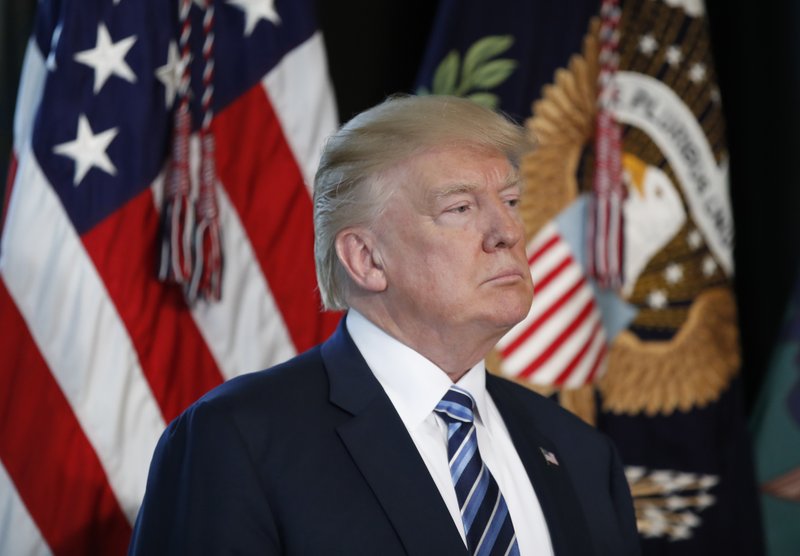
As the political clamor caused by a top Christian magazine’s call to remove President Donald Trump from office continues to reverberate, more than 100 conservative evangelicals closed ranks further around Trump on Sunday. In a letter to the president of Christianity Today magazine, the group of evangelicals chided Editor-in-Chief Mark Galli for penning an anti-Trump editorial, published Thursday, that they portrayed as a dig at their characters as well as the president’s. “Your editorial offensively questioned the spiritual integrity and Christian witness of tens-of-millions of believers who take seriously their civic and moral obligations,” the evangelicals wrote to the magazine’s president, Timothy Dalrymple. The new offensive from the group of prominent evangelicals, including multiple members of Trump’s evangelical advisory board, signals a lingering awareness by the president’s backers that any meaningful crack in his longtime support from that segment of the Christian community could prove perilous for his reelection hopes. Though no groundswell of new anti-Trump sentiment emerged among evangelicals in the wake of Christianity Today’s editorial, the president fired off scathing tweets Friday accusing the establishment magazine – founded by the late Rev. Billy Graham in 1956 — of becoming a captive of the left. The letter to the magazine’s president sent on Sunday also included a veiled warning that Christianity Today could lose readership or advertising revenue as a result of the editorial, which cites Trump’s impeachment last week. Citing Galli’s past characterization of himself as an “elite” evangelical, the letter’s authors told Dalrymple that “it’s up to your publication to decide whether or not your magazine intends to be a voice of evangelicals like those represented by the signatories below, and it is up to us and those Evangelicals like us to decide if we should subscribe to, advertise in and read your publication online and in print, but historically, we have been your readers.” Among the signatories of the letter are George Wood, chairman of the World Assemblies of God Fellowship; Rev. Tim Hill of the Church of God; former Arkansas governor and GOP presidential hopeful Mike Huckabee; and former Minnesota GOP Rep. Michele Bachmann. Galli told CBS’ “Face the Nation” on Sunday that he views the chances of Trump leaving office, either through a reelection loss or post-impeachment conviction by the Senate, as “probably fairly slim at this point.” The editor-in-chief defended his editorial as less of a “political judgment” than a call for fellow evangelicals to examine their tolerance of Trump’s “moral character” in exchange for his embrace of conservative policies high on their agenda. “We’re not looking for saints. We do have private sins, ongoing patterns of behavior that reveal themselves in our private life that we’re all trying to work on,” Galli said Sunday. “But a president has certain responsibilities as a public figure to display a certain level of public character and public morality.” Galli referred comment on Sunday’s evangelical letter to Dalrymple, who on Sunday published his own strongly worded defense of the magazine’s anti-Trump commentary. Countering Trump’s suggestion that the magazine had shifted to favor liberals, Dalrymple wrote that the publication is in fact “theologically conservative” and “does not endorse candidates.” “Out of love for Jesus and his church, not for political partisanship or intellectual elitism, this is why we feel compelled to say that the alliance of American evangelicalism with this presidency has wrought enormous damage to Christian witness,” Dalrymple wrote. Asked about the editorial’s indictment of Trump by “Fox News Sunday,” Marc Short – chief of staff to Vice President Mike Pence, himself a prominent evangelical Christian – cited some of the policy positions that have helped endear the president to many in that voting bloc. “For a lot of us who are celebrating the birth of our Savior this week, the way that we look at it is that this president has helped to save thousands of similar unplanned pregnancies,” Short said Sunday, adding that “no president has been a greater ally to Israel than this president.” Roughly 8 in 10 white evangelical Protestants say they approve of the way Trump is handling his job, according to a December poll from The AP-NORC Center. The Trump campaign is planning a Jan. 3 event in Miami called “Evangelicals for Trump.” Associated Press religion coverage receives support from the Lilly Endowment through the Religion News Foundation. The AP is solely responsible for this content. This story has been corrected by deleting a reference to Samuel Rodriguez as among those who signed a letter Sunday, which he was not. By Elana Schor Associated Press Republished with the Permission of the Associated Press.
Former Arkansas governor Mike Huckabee endorses Twinkle Cavanaugh for Lt. Gov.
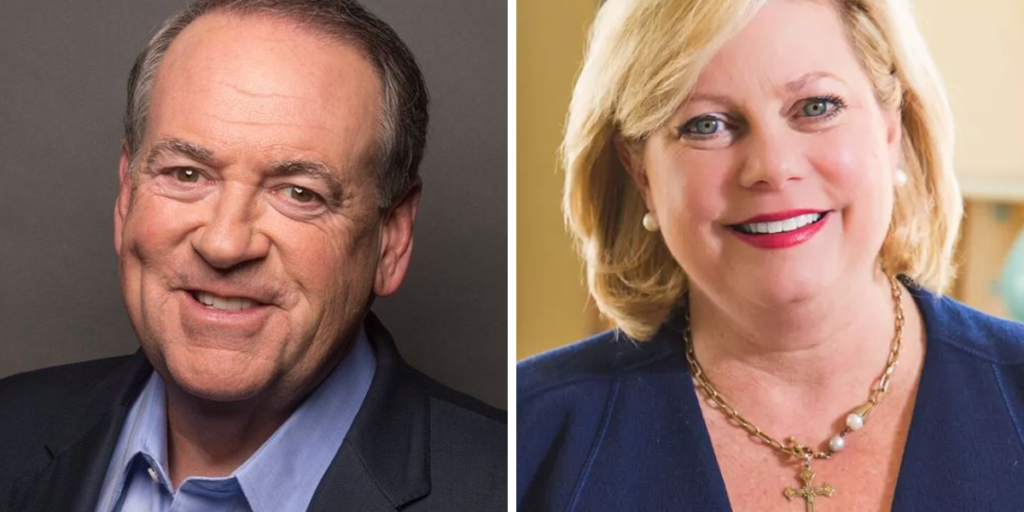
Former Arkansas governor and presidential candidate Mike Huckabee endorsed President of the Public Service Commission and Lieutenant Governor-hopeful Twinkle Cavanaugh on Monday. Cavanaugh chaired Huckabee’s 2008 Presidential Campaign in Alabama, when he carried the state over Sen. John McCain and Gov. Mitt Romney. Before becoming Arkansas’ 44th Governor, Huckabee served in the ministry. “I have known Twinkle for over a decade and consider her to be a friend and a staunch Republican ally,” Huckabee announced. “But I am not supporting Twinkle simply because we are friends. I am supporting Twinkle because of the Christian, conservative values she and I share. We need leaders who are not afraid to fight for their core values and have the courage to hold their peers accountable when they stray from their promises to the people. Twinkle has kept her promises as President of the Public Service Commission, shrinking her agency’s budget by 30%, saving the taxpayers over $60 million through cuts, and bringing transparency and honesty to the office.” Cavanaugh said she’s honored to receive Huckabee’s endorsement. “I am honored to have the endorsement of my friend, Governor Mike Huckabee,” Cavanaugh said. “Governor Huckabee has been a role model to me throughout my time in public service, and I am deeply humbled that he has chosen to support our campaign and our vision of a brighter future for our children and grandchildren.” There are 13 days until the July 17 primary runoff election.
Scott Dawson stresses evangelist background, outsider status
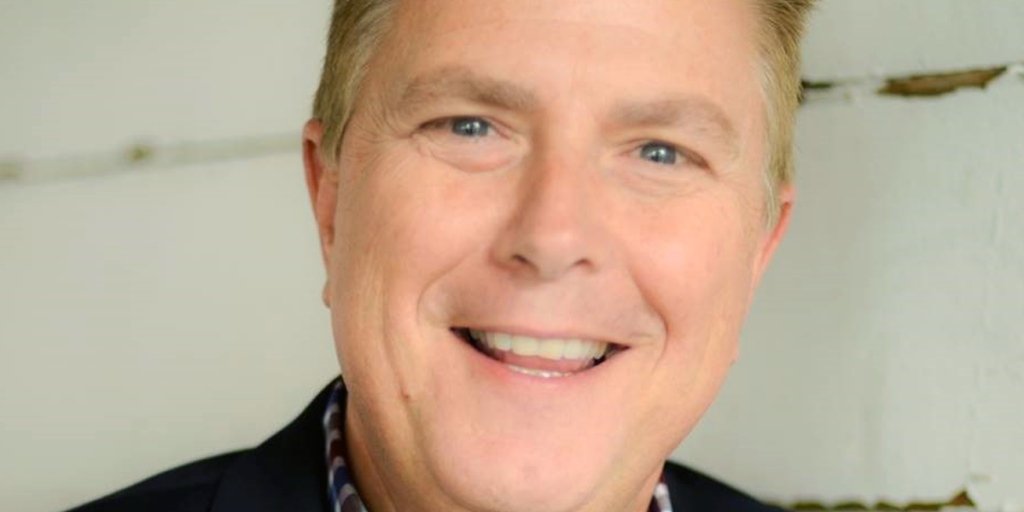
Republican gubernatorial hopeful and evangelist Scott Dawson said if people are surprised to see him running for governor, they are not alone. In a way, he is too. Dawson said he got in the governor’s race because he was tired of the state being embarrassed by corruption, noting the number of recent governors involved in scandals. He said he sees his newness to the political arena as an advantage, not a hindrance. “I’m one of us. I’m not a politician. The competitive advantage I’ve got is that everyone else is serving in office. I’m the one that’s been one of us for 30 years,” Dawson said. Dawson is one of three Republicans, along with Huntsville Mayor Tommy Battle and state Sen. Bill Hightower, challenging Alabama Gov. Kay Ivey in the June 5 Republican primary. Speaking at a lunchtime gathering at a senior center in Jasper, Dawson said some will argue the state needs a “seasoned politician” or a businessman as governor. “I am convinced more than ever before, Alabama needs a leader. Alabama needs someone who can cast a vision,” he said. Dawson, 50, is a native of Ensley and graduated from Samford University and Beeson Divinity School. He is the founder of the Scott Dawson Evangelistic Association. The organization, among other things, hosts youth and pastor retreats and large-scale Christian revival meetings. “I’ll go ahead and tell you I make decisions through a Biblical world view,” Dawson told the crowd in Jasper, adding quickly that he understands “we’re not creating a theocracy” and respects those of different beliefs. While trailing far behind in monetary donations, Dawson’s underdog campaign has been assisted by prominent friends made during his decades in ministry, and whose names he mentions in his campaign speech. He announced his intention to run on the Rick and Bubba Show, a syndicated morning radio show; has turned to former Arkansas Gov. Mike Huckabee for advice; and received donations from Hobby Lobby co-founders David and Barbara Green. Dawson said he supports legislation that would take Alabama “out of the marriage business” by doing away with probate judge-signed marriage licenses. He said he also supports the repeal of the Common Core curriculum standards and would like to implement mandatory drug testing for students seeking to be involved in extracurricular activities. Asked about education funding, Dawson responded that he thought the state has a “leadership issue” and not a “funding issue.” However, Dawson said he has declined to sign a no new taxes pledge. Dawson made the decision to run in early 2017, thinking that he would be running for an open seat. Instead, Ivey became governor after former Gov. Robert Bentley resigned in scandal. She is seeking a full term after a year of holding office. Dawson has criticized Ivey’s decision not to attend debates with her primary challengers, saying that she should be “vetted” for the position since she wasn’t previously elected governor. Ivey’s campaign has said she is focused on official duties, and that her record is open to voters and the media. Republished with the permission of the Associated Press.
Mike Huckabee stumps for gubernatorial candidate Scott Dawson
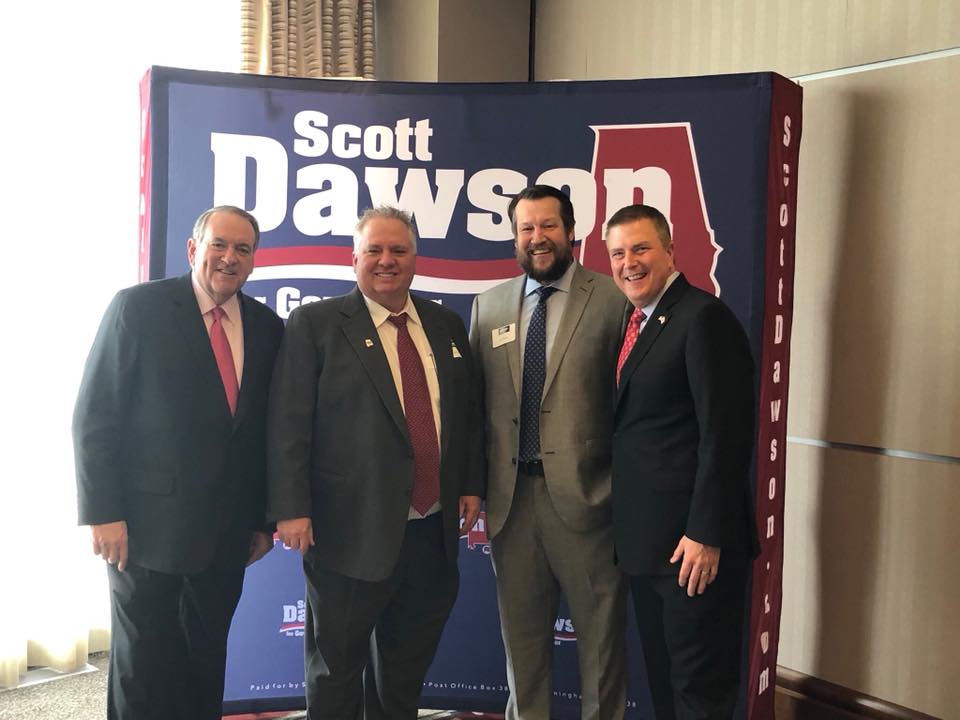
Mike Huckabee, former Governor of Arkansas and former candidate for President of the United States, joined Republican gubernatorial candidate Scott Dawson Monday night, along with Alabama radio personalities Rick and Bubba for a “Kickoff to Win Rally.” “What a joy to be here with the next Governor of Alabama, Scott Dawson,” Huckabee told the crowd as he walked on stage at the Pelham Civic Complex in Pelham, Ala. Huckabee explained if we’re to save the Republic, our country and states needs politicians willing to change the status quo. “I really believe we’re in a time in our country where we need disruptive personalities, who are willing and ready and able and committed to go and be different than the kind of politicians that we have had that have led us into a level of trouble that will end this great Republic if we don’t change the course of our country and our individual states,” stated Huckabee. Huckabee also said Dawson has the sort of humility voters should want in a political leader. “Here’s why I came… when I got to know Scott I realized here is a person who has something that very few people in political life have, humility,” added Huckabee “Real honest to goodness humility… He’s got an honest assessment of who he is. He doesn’t think he’s better than God thinks he is, or worse than God thinks he is. He just knows who he is and he’s willing to be that servant, that vessel, through whom the Lord can do something extraordinary.” Dawson will face incumbent Gov. Kay Ivey, Tommy Battle, Bill Hightower, and Michael McAllister in the June 5 Republican primary. The winner will go on to face the Democrat nominee in the general election, to be selected among: Tuscaloosa Mayor Walt Maddox, former state Supreme Court Chief Justice Sue Bell Cobb, Christopher Countryman, James Fields, Doug Smith or Anthony White. Watch Facebook live coverage of the event below:
Donald Trump looking to Sarah Huckabee Sanders in tough moments
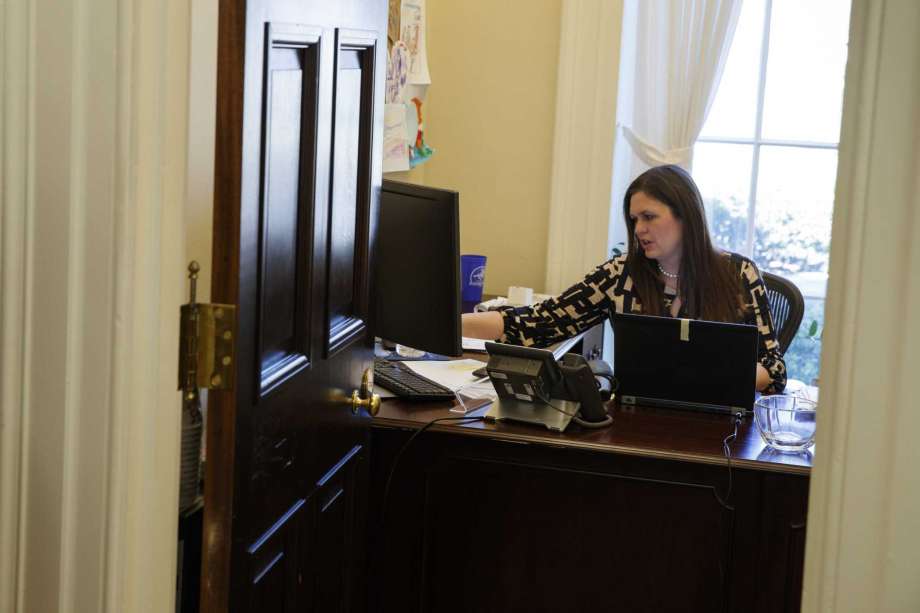
Faced with aggressive on-air questioning about the president’s wiretapping claims, Sarah Huckabee Sanders didn’t flinch, she went folksy. Speaking to George Stephanopoulos on “Good Morning America,” she pulled out a version of an old line from President Lyndon Johnson: “If the president walked across the Potomac, the media would be reporting that he could not swim.” The 34-year-old spokeswoman for President Donald Trump was schooled in hardscrabble politics — and down-home rhetoric — from a young age by her father, former Arkansas Gov. Mike Huckabee. Her way with a zinger — and her unshakable loyalty to an often unpredictable boss — are big reasons why the deputy press secretary is a rising star in Trump’s orbit. In recent weeks, Sanders has taken on a notably more prominent role in selling Trump’s agenda, including on television and at White House press briefings. As White House press secretary Sean Spicer’s public profile has fluctuated in recent weeks amid criticism of his performance, Sanders has increasingly become a chief defender of Trump in some of his toughest moments. Sanders’ rise has fueled speculation that she’s becoming the president’s favored articulator, a notion she disputes. “It’s hard for any one person to maintain a schedule of being the singular face all day every day,” she said. She argued that more than one press aide spoke for President Barack Obama. “When Eric Schultz went on TV did anybody say Josh Earnest is getting fired?” Sanders asked. “Was that story ever written?” Spicer echoed that message: “My goal is to use other key folks in the administration and the White House to do the shows.” Indeed, speaking on behalf of this president is a challenging and consuming job. Trump often presents his own thoughts directly on Twitter in the early hours of the morning and is known to closely follow his surrogates on television, assessing their performances. He has been happy with Sanders’ advocacy, said Kellyanne Conway, a counselor to the president. “She understands America. She understands the president. And she understands how to connect the two,” said Conway, who noted that Sanders had appeared on television throughout the campaign as well. “The president has a great deal of trust in Sarah.” On some days recently Sanders has been the administration’s messenger of choice, even when news outlets aren’t thrilled. Last Sunday, NBC’s Chuck Todd said on-air that “Meet the Press” had sought a “senior administration official or a Cabinet secretary,” but that the “White House offered a deputy press secretary. And so we declined.” Sanders credits her larger-than-life dad with helping her learn how to deliver a message. Huckabee, a frequent political commentator, has long been famed for his pithy rhetoric. The two speak most mornings before 6 a.m. “I’ll call and say, ‘What do you think if I say this?’ He’ll say, ‘That’s really good. You might try to say it a little bit more like X,’” she said. On advocating for the unconventional Trump, Sanders admits that even in the press office, they don’t always get a heads up before Trump tweets. But she says part of Trump’s appeal is that he “directly communicates with the American people on a regular basis.” Arkansas-raised, Sanders moved her young family to Washington to be part of the administration. She is married to a Republican consultant and they have three young children. She joined the Trump campaign not long after her father’s second presidential bid — which she managed — fizzled out in the 2016 Iowa caucuses. She said she was drawn to Trump’s message of economic populism and his outsider attitude. “One of the big things my dad was running on was changing Washington, breaking that cycle,” Sanders said. “I felt like the outsider component was important and I thought he had the ability to actually win and defeat Hillary.” She also said she was drawn to the Trump family’s close involvement in the campaign, “having kind of been in the same scenario for my dad’s campaign.” Being part of an effort to defeat Hillary Clinton had extra significance for Sanders, whose father entered the Arkansas governor’s mansion just a few years after Bill Clinton exited and who shared advisers and friends in the state. Sanders said at times it was difficult to be aggressive, but she “so disagreed” with Hillary Clinton’s policies, that she kept on. Sanders entered politics young, helping with her father’s campaigns as a child and then working her way up the ranks until she had the top job in 2016. In 2007, she moved to Iowa to run her father’s operation in the leadoff caucus state, where he was the surprise winner. She has also served in the Education Department under President George W. Bush and worked on a number of Senate and presidential campaigns. Mike Huckabee said his daughter was always a natural. “When most kids at 7 or 8 are jumping rope, she’s sitting at the kitchen table listening to Dick Morris doing cross tabs on statewide polls,” said Huckabee, referring to the adviser-turned-adversary to President Bill Clinton. Those Arkansas ties continue to hold strong. Sanders has consulted with friends from the state about her new role, including Mack McLarty, the former Clinton chief of staff, who she said counseled her to appreciate the “historic opportunity” to work in the White House. Her rising profile has come with ups and downs. Sanders says she is turning off social media alerts because she has been flooded with criticism. For now, she has not been treated to a portrayal on “Saturday Night Live” — like Spicer and Conway. But her dad says that if that comes next, she should roll with it. “One of the great honors of life is to be parodied,” Huckabee said. “It’s kind of an indication that you’ve arrived at a place of real power.” Republished with permission of The Associated Press.
Presidential Primary Brief: 273 days until Election Day
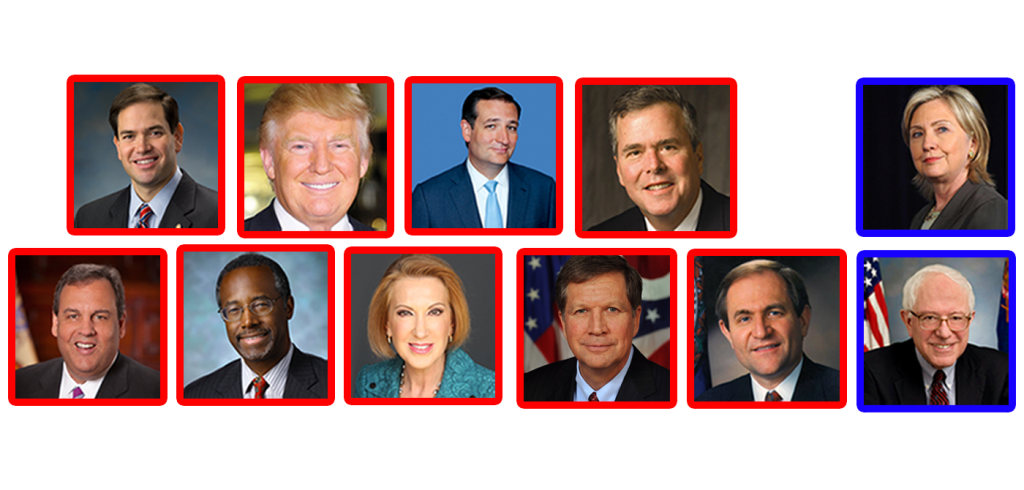
21 days until AL Presidential Primary 273 days until Election Day Convention Dates: Republican July 18-21, 2016, Democratic July 25-28, 2016 Weekly Headlines: Iowa caucuses kick off 2016 presidential election Donald Trump says Ted Cruz stole victory in Iowa caucuses Hillary Clinton wins Iowa caucuses Press Clips: 5 takeaways from the GOP debate (Politico 2/7/16) Here’s what everyone is supposed to write: Marco Rubio, the communal target of the GOP field looking to knock him down, stumbled badly, reciting his pre-scripted pablum of a soulless establishment-candidate cyborg. Meh. Rubio wasn’t great. The morning-after narrative is Marco the Rube — and his weird triple talking-point repeat just might be enough to slow down the young man in hurry, even though the polls have shown him only modestly rising into second place here behind Donald Trump. Marco Rubio slams Obama’s speech on Fighting Islamophobia (Huffington Post 2/3/16) Republican presidential candidate Sen. Marco Rubio (R-Fla.) somehow found a way to criticize President Barack Obama’s speech on Wednesday denouncing anti-Muslim bigotry. Rubio, who often stresses religious liberty and his own faith on the campaign trail, said Obama’s words at a Baltimore mosque were intended to divide, rather than unite, the American people. “I’m tired of being divided against each other for political reasons like this president’s done,” Rubio said at a Wednesday campaign stop in Dover, New Hampshire. “Always pitting people against each other. Clinton’s margin of victory shrinks to 0.25 after Iowa audit (Politico 2/7/16) Hillary Clinton still has defeated Bernie Sanders in the Iowa Democratic caucus, but an internal party review released Sunday found new errors in the original count that further narrowed her margin of victory — a result that’s likely to keep scrutiny on the caucus state while the rest of the country looks to New Hampshire. The audit by the Iowa Democratic Party discovered errors in five of 14 precincts across the state from Monday’s caucuses that shrink Clinton’s overall advantage in the key delegate results to a 0.25 percent lead over Sanders, down from 0.27 percent. Martin O’Malley to drop out of Democratic presidential race (The Wall Street Journal 2/2/16) The first casualty of Iowa’s caucuses is former Maryland Gov. Martin O’Malley, who announced Monday night that he was dropping out of the Democratic presidential race after a disappointing showing. Mr. O’Malley told supporters at a Des Moines bar that he was suspending a campaign that never gained traction against rivals Hillary Clinton and Bernie Sanders. He did not endorse either of the two. With about 90% of the Iowa caucus results reported, Mr. O’Malley stood at less than 1%. Mike Huckabee suspends his 2016 campaign (Politico 2/1/16) Mike Huckabee suspended his bid for the Republican nomination, ending a second run that overshadowed by other candidates in the former Arkansas governor’s social-conservative lane. Huckabee’s announcement concludes a campaign that was not nearly as prominent as his previous run at the Republican nomination in 2008, where he won eight states, including the Iowa caucus. Rand Paul ends presidential bid (USA Today 2/3/16) Kentucky Sen. Rand Paul, who had hoped to ride libertarian support to the Republican presidential nomination, withdrew from the race after a fifth-place showing in the Iowa caucuses. “It has been a privilege to give voice to the liberty movement in this race, and I believe we have broadened the debate by being part of it,” Paul said on Fox News. “Although today I will suspend my campaign for the presidency, I will continue to fight on for liberty, for the Constitution, for justice in the United States Senate.” Paul, 53, is running for re- election in November to a second Senate term. Wednesday morning, he posted this video thanking his supporters on Twitter. Kasich wraps himself in Reagan (Politico 2/7/16) The Ohio governor, who’s fighting to win over more moderate New Hampshire Republicans not enamored of Ted Cruz or Donald Trump, compared himself twice to Ronald Reagan within a few minutes on Sunday in an interview with Jake Tapper on CNN’s “State of the Union.” Tapper asked Kasich about a remark he made on Saturday, when a Democratic voter told Kasich on the trail that Kasich was the only Republican he’d consider supporting. Kasich joked that maybe he “ought to be running in a Democrat primary.” Rick Santorum drops presidential bid, endorses Marco Rubio (CNN 2/3/16) Former Pennsylvania Sen. Rick Santorum ended his presidential bid on Wednesday, throwing his support behind Florida Sen. Marco Rubio. Santorum made the announcement Wednesday night on Fox News’ “On the Record,” saying he spoke with Rubio “for more than hour” Tuesday before making up his mind. Santorum won the 2012 Iowa caucuses and ended that race with the second-most number of delegates to eventual GOP nominee Mitt Romney. But he was unable to capture any momentum this year despite extensive barnstorming efforts in Iowa. He is the third Republican presidential candidate to drop out after Monday’s caucuses. Mike Huckabee ended his campaign that night, and Rand Paul suspended his campaign Wednesday morning. Trump stands by proposal to revive waterboarding (Politico 2/7/16) Donald Trump, who vowed to bring back waterboarding and “a hell of a lot worse than waterboarding,” stood by his proposal on the Sunday shows, while refusing to say exactly how he’d reinstate the harsh and controversial interrogation technique banned during President George W. Bush’s second term. Trump vowed during the Republican debate on Saturday night to bring back waterboarding and “a hell of a lot worse that waterboarding.
Debate takeaways: Without Donald Trump, spotlight on Ted Cruz, Marco Rubio
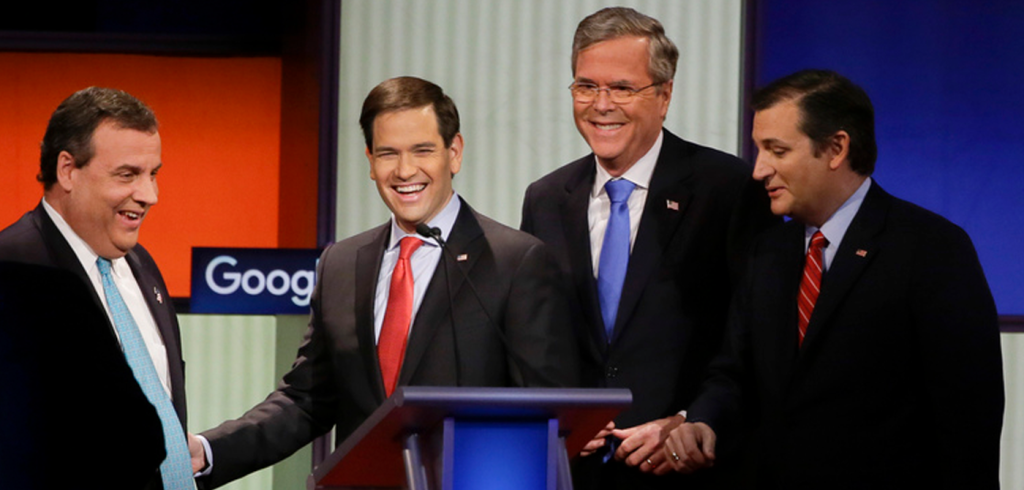
It was clear, even before it started, that Thursday night’s Republican presidential debate would be dramatically different. GOP front-runner Donald Trump had voluntarily given up his regular place at center stage. He skipped the debate, preferring to mount a rally across town to punish Fox News Channel for “toying” with him. The billionaire businessman’s absence was addressed early and then his Republican rivals quickly moved on, getting a far better opportunity to shine. Overall, the two-hour affair featured a sober tone focused more on substance than personality. There were exceptions, of course. Ted Cruz defended his authenticity and Marco Rubio faced pointed questions on immigration. But just days before Iowa’s leadoff caucuses, there were none of the breakout moments that have sometimes characterized the more colorful debates featuring Trump, battling Cruz for first place in the 2016 primary season’s opening contest. Some takeaways from Thursday’s Republican debate: ELEPHANT NOT IN THE ROOM Trump has repeatedly demonstrated his ability to dominate the stage. There is little doubt he helped his rivals by not showing up. He was mocked early and largely forgotten. Cruz set the tone with a sarcastic impression of his top rival: “I’m a maniac and everyone on this stage is stupid, fat and ugly,” Cruz said. “Now that we’ve gotten the Donald Trump portion out of the way …” Florida Sen. Marco Rubio also weighed in: “It’s not about Donald Trump. He’s an entertaining guy. He’s the greatest show on earth.” Beyond a few playful jabs, the two-hour debate was a Trump-free zone, one of the few such events in the race so far. CRUZ THE FRONT-RUNNER Cruz fought to make sure he was positioned at center stage in Trump’s absence, but did little to take advantage of the opportunity. He tried to embrace the role of de facto front-runner at the outset, pointing out that he was being attacked by several rivals — even before there were any pointed exchanges. Cruz later faced sharp questions on immigration, national security and, perhaps most importantly, whether he was trustworthy. Trust is the theme of the fiery conservative’s campaign, and several candidates questioned his authenticity. “Ted, throughout this campaign, you’ve been willing to say or do anything in order to get votes,” Rubio charged. Cruz fought back by accusing Rubio of bending to the will of donors on immigration, but it was hardly a decisive victory. NO AMNESTY FOR RUBIO Rubio did not help himself among the conservatives who question his position on immigration. The issue is by far his greatest vulnerability as he tries to convince skeptical GOP activists that he doesn’t support so-called amnesty. The debate moderators played a series of video clips highlighting Rubio’s apparent shift on the issue, which put the first-term senator on the defensive at the outset of a key exchange. At best, Rubio may have clouded the issue of whether he had backed off his earlier calls for comprehensive legislation that includes a pathway to citizenship. But rival Jeb Bush seemed to get the best of him in an exchange in which Bush questioned Rubio’s retreat on the issue. “You shouldn’t cut and run,” Bush charged. BUSH CLOUDS LANE Bush repeatedly beat back questions about his long-term viability in the 2016 contest, insisting he has a path to the nomination and would ultimately defeat leading Democrat Hillary Clinton. “We’re just starting. The first vote hasn’t been counted. Why don’t we let the process work?” Bush said. Overall, Bush had more success on the debate stage without having to contend with Trump. His strength — and full-steam-ahead approach — was a pointed reminder that the fight for the party’s mainstream wing is far from over. Bush and Rubio are competing with New Jersey Gov. Chris Christie and Ohio Gov. John Kasich to win over the GOP’s centrist wing. Some party officials hoped Rubio would have emerged as the consensus choice by now. Bush defended rounds of anti-Rubio attack ads. “This is beanbag compared to what the Clinton hit machine is going to do to the Republican nominee,” Bush said. TRUMP’S COUNTERPROGRAMMING It was a risky move politically, but Donald Trump helped raise $6 million to benefit veterans at an event 3 miles away from the debate stage. Instead of going after his rivals on national television, Trump read out the names of wealthy friends who’d pledged major contributions to veterans’ causes. When he announced he’d pledged $1 million himself, the crowd erupted in cheers. He explained to the Drake University crowd that he had little choice but to skip the debate. Trump admitted he didn’t know if the decision would hurt him in the polls, but tried to cast it as a sign of strength. “You have to stick up for your rights. When you’re treated badly, you have to stick up for your rights,” he said. As for the debate, Trump predicted it would have far fewer viewers without him on the stage. That may be true, but Iowa voters will decide in four days whether Trump hurt his chances in the 2016 race simply to prove a point. Material from The Associated Press was used in this report.
Ala. Secretary of State John Merrill campaigns for Mike Huckabee in Iowa
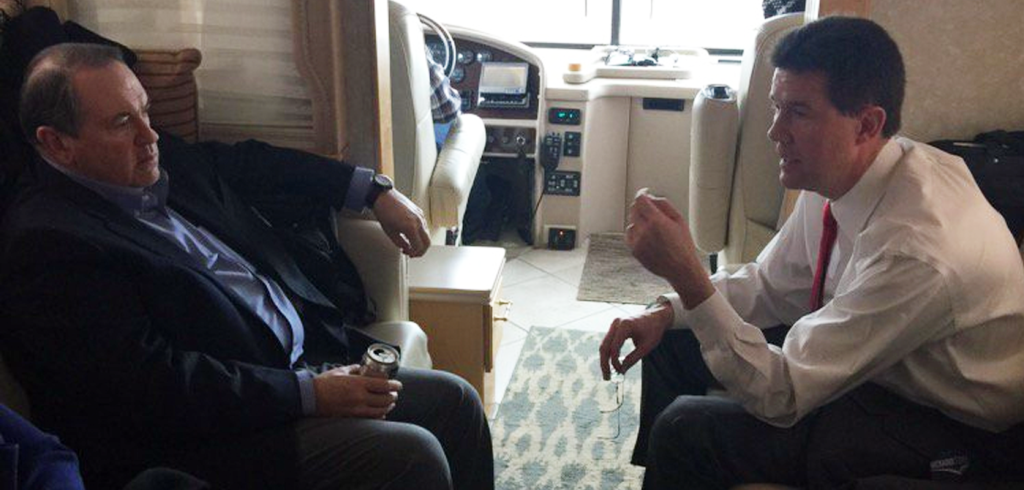
Alabama Secretary of State John Merrill has been on the campaign trail in Iowa with Republican presidential candidate Mike Huckabee, where he has been giving a play-by-play via his Twitter feed. Merrill arrived in Iowa on Sunday and has since spoken at eight of Huckabee’s 10 campaign stops across the state as all of the Republican candidates are making their last pitch before the Iowa caucuses. Merrill will be in attendance at tomorrow night’s Republican debate before making the trip home Friday evening. “The crowds have been good but, more importantly, they’ve been energized,” Merrill said. “That’s what we need right now. I wouldn’t come out here if it wasn’t for someone I believe in.” On the road in the great state of Iowa w/ @GovMikeHuckabee as we travel the nation’s heartland working toward Monday pic.twitter.com/cRbgLefJOT — John Merrill (@JohnHMerrill) January 27, 2016
Marco Rubio says faith “single greatest influence in my life”
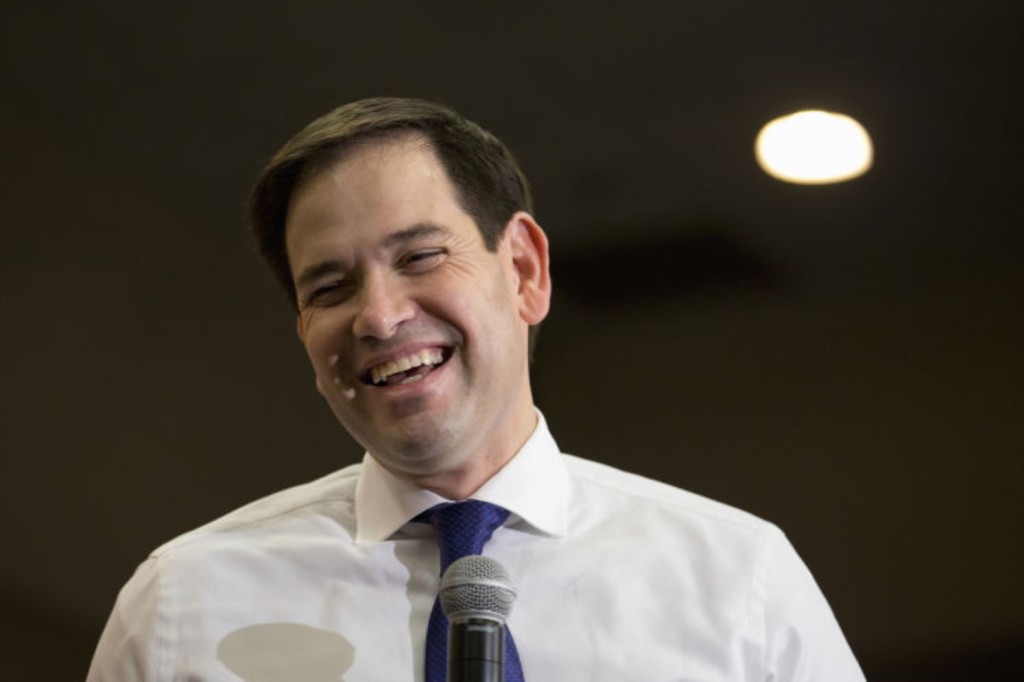
Republican presidential hopeful Marco Rubio promised to keep “talking about God” as he campaigned across Iowa Monday, reminding influential evangelical voters of his commitment to Christian values just two weeks before the state’s lead-off caucuses. The Florida senator’s GOP rivals have dismissed him as too moderate at times, but on Monday, he spoke of how Christian conservative values would guide his decisions in the White House, if he is elected. The Florida senator, a Catholic, opened up about religion when confronted by an atheist during a town hall-style meeting in Waverly, Iowa. “No one’s going to force you to believe in God. But no one’s going to force me to stop talking about God,” Rubio told the atheist, Justin Scott, of Waterloo. Added Rubio, “Not only am I a Christian, not only am I influenced by my faith, but it is the single greatest influence in my life. And from that, I’ll never hide.” Looking up at businessman Donald Trump and Texas Sen. Ted Cruz in the polls, the first-term senator is trying to break out of the crowded Republican field. There are several candidates aggressively courting Iowa’s religious conservatives, who typically play outsize influence in the opening contest. Cruz is particularly popular among such voters, as is retired neurosurgeon Ben Carson, former Arkansas Gov. Mike Huckabee and former Pennsylvania Gov. Rick Santorum. Rubio’s focus on religion would be less appealing in New Hampshire, which holds the nation’s first presidential primary eight days after the Iowa caucuses and typically rewards economic, rather than social conservatives. In Waverly, the second of five campaign appearances Rubio had scheduled Monday, he renewed his opposition to abortion and promised to strip funding from Planned Parenthood if elected. He also said pastors, bakers and florists shouldn’t be penalized for refusing to participate in a same-sex marriage. On abortion, Rubio supports an exception for the life of the mother, but opposes exceptions in cases of rape and incest. “I believe every human being, no matter what stage you are in your development, even if you don’t have a birth certificate, even if you don’t have a lawyer, even if you don’t have a name, has a right to live,” Rubio said, adding that he respects people on the other side of the debate. Rubio told the atheist that his Christian faith shouldn’t be a concern. “In fact, I think you should hope my faith influences me,” Rubio said, noting that his faith outlines an obligation to care for the less fortunate, to love his neighbor and feed the hungry. “I’m going to share my faith, especially when I’m asked, because my faith influences who I am in every aspect of my life,” he said. Rubio added that he’ll live to 85 or 90, if he’s lucky. “But I’m more interested in eternity and the ability to live forever with my creator,” he said. “And that’s what I aspire to more than anything else.” Republished with permission of the Associated Press.
Former George W. Bush campaign bus driver says Mike Huckabee infringing on copyright
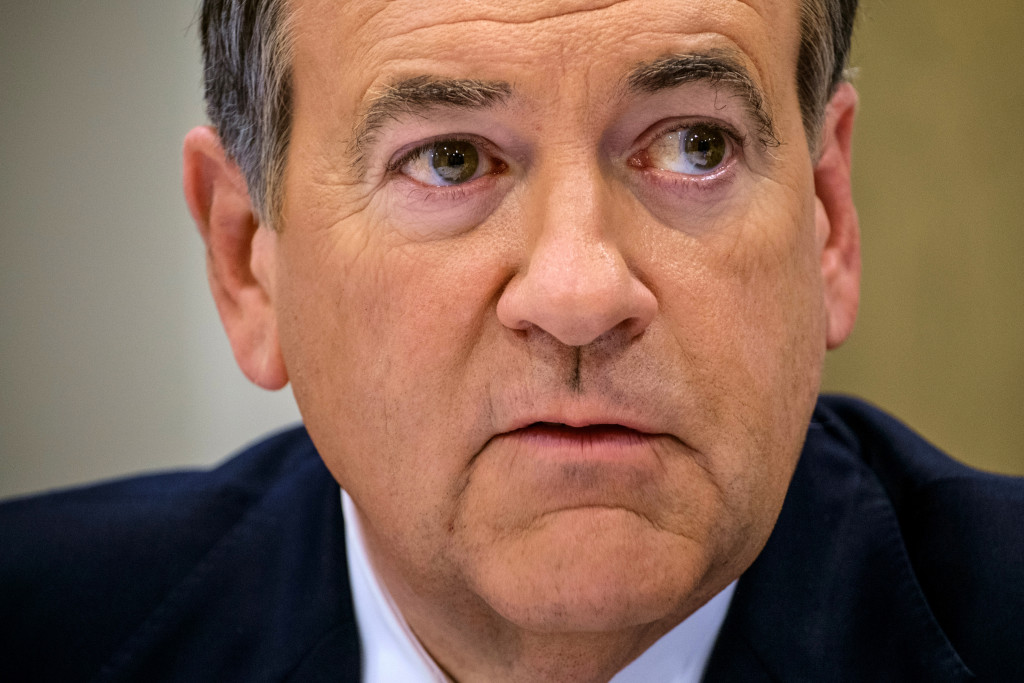
Former campaign bus driver for multiple Republican candidates, Montgomery, Alabama, native Johnny Williams took to Facebook recently to call out presidential candidate and former Arkansas Gov. Mike Huckabee over what Williams terms infringement on his copyrighted bus name “Asphalt One.” “I have just been made aware that one of the long shot Presidential Candidates, Mike Huckabee, is using my Copyrighted name, ‘Asphalt One’ on his bus, and in his fundraising letters,” wrote Williams, who is evidently not a fan of Huckabee’s. “I want the people of Iowa, to know that this is not me,” Williams wrote. “That name is part of my Legacy, and I don’t want my winning record spoiled, because we worked with winners for the last 27 years. I am going to ask him nicely, if I can get past his handlers, to stop using it without my permission.” Williams has driven for candidates such as both Presidents Bush, Pat Robertson, and several others with his Johnny Williams Bus Charters company, which he operated for 30 years. Huckabee was using the phrase on social media as recently as Tuesday, as seen in the Tweet below: #AsphaltOne – @JHoganGidley workin’ hard, @chipsaltsman takin’ a break, & @GovMikeHuckabee chats w/ @janethuckabee. pic.twitter.com/sreKgHbg6a — Gov. Mike Huckabee (@GovMikeHuckabee) January 5, 2016 Williams provided the following text from the Lyndon B. Johnson Presidential Library to bolster his claim of longstanding use of the name, and provide a little history of campaign bus titles. “Whatever other type of military and non-military transportation used by the President is typically dubbed in the same manner, usually unofficially as it is normally a temporary use. In 1992, President George H.W. Bush campaigned in the former presidential train dubbed ‘Rail One.’ In 2004, President George W. Bush‘s campaign bus was dubbed ‘Asphalt One’ (which was the name of his campaign bus when he ran for Governor of Texas in 1998). In 2012, President Barack H. Obama campaigned in the newly acquired Presidential Bus dubbed ‘Ground Force One.’ Also, ‘Executive One’ has been used on a variety of transportation types most frequently on non-military aircraft.” Williams’ connection to the Asphalt One brand is also documented in a 1998 article in the Wall Street Journal. It begins by describing Bush rolling into a small town: “The bus called ‘Asphalt One’ rolls into this tiny east Texas town, distilling Gov. George W. Bush’s campaign message into two words emblazoned on its flank: ‘Opportunity’ and ‘Responsibility.’”
7 things to watch in monthlong sprint to Iowa’s caucuses

The 2016 presidential election has defied all expectations so far. An enormous field of GOP candidates, still a dozen strong with a month to go before the leadoff Iowa caucuses on Feb. 1. The billionaire outsider who has tapped into the anger and fears of a nervous nation. A son and brother of presidents who is struggling to connect with voters despite his tremendous financial advantage. In less than a month, voters will begin having their say in what could turn out to be a bitter, monthslong fight for the Republican nomination. On the Democratic side, front-runner Hillary Clinton is banking on neatly locking up the nomination as her GOP rivals tear each other down. Some things to watch for in the four-week sprint to the Iowa caucuses: DONALD TRUMP’S CHECKBOOK To date, wealthy businessman Donald Trump has run a frugal campaign, skipping expensive television advertising as his Republican rivals and their affiliated super political action committees spend tens of millions of dollars on airtime. Trump has promised that that’s about to change, announcing plans last week to spend $2 million a week on the air in three early voting states. Will Trump follow through on that promise? Television ad prices are only increasing as the voting draws closer, and Trump has yet to reserve any airtime. TED CRUZ’S CLERGY Texas Sen. Ted Cruz is building a large organization of support in Iowa, amassing county leaders across the state and tapping a member of the clergy in each of the 99 counties. The son of a preacher, Cruz aims to take a well-worn path to victory in Iowa: Former Arkansas Gov. Mike Huckabee in 2008 and former Pennsylvania Sen. Rick Santorum in 2012 generated similar support among the state’s evangelical voters, and each won the caucuses. The question is whether that network of religious conservatives will coalesce behind Cruz this time or splinter. Cruz has made strides, picking up the endorsements of Iowa evangelical leader Bob Vander Plaats and Focus on the Family founder James Dobson. ESTABLISHMENT CHOICES Former Florida Gov. Jeb Bush, who entered the race in June as the front-runner, jokes that his father, former President George H.W. Bush, has taken to throwing shoes at his television set in response to Trump. But as the caucuses near, the laugh lines have given to persistent frustration among party elders and its professional class that Trump remains a viable candidate. Several have said an effort must be mounted to take down Trump, but a coordinated campaign of negative ads has so far failed to materialize. That’s because in part to concerns that it could backfire and further motivate Trump’s supporters, but also because several candidates vying to be the establishment choice are still in the race. Will there be an attempt to undermine Trump? Will Bush — or Florida Sen. Marco Rubio, Ohio Gov. John Kasich or New Jersey Gov. Chris Christie — emerge as the clear alternative to Trump before Trump or Cruz collects too many delegates to matter? DEPARTURE LOUNGE Two low-polling Republicans quit in December: South Carolina Sen. Lindsey Graham and former New York Gov. George Pataki. While all the remaining candidates insist they’re not going anywhere, pressure could grow on other candidates to bow out and narrow the field. Among those feeling the heat: Santorum, who has failed to produce the kind of excitement that propelled him to that Iowa victory four years ago. If he and others at the bottom dropped out and endorsed the same candidate, it could give rise to the Trump alternative who some are desperately seeking. CLINTON’S TEST A third-place finish in 2008 in Iowa completely disrupted Clinton’s strategy to win the Democratic nomination, and she never could catch then-Illinois Sen. Barack Obama. This time, Clinton has poured significant resources and staff into the state. Polls show her with an edge over her chief rival, Sen. Bernie Sanders, a Vermont independent. If Clinton wins Iowa, a loss in New Hampshire to Sanders would be easier to contain. Back-to-back losses in Iowa and New Hampshire would generate fresh worries among Democrats about their front-runner. JANUARY SURPRISES The attacks in Paris and San Bernardino, California, shifted voters’ focus to national security issues. That was to the detriment of less-experienced and less-hawkish candidates, including retired neurosurgeon Ben Carson on the GOP side and Sanders. Another attack, especially on American soil, could further diminish candidates without experience in office or those uncomfortable with a campaign focus on foreign policy. FINAL DEBATES The Republicans have two more debates — Jan. 14 in South Carolina and Jan. 28 in Iowa — before the Feb. 1 caucuses. Democrats will debate Jan. 17, also in South Carolina. The GOP debates in 2015 broke viewership records, and the next two probably may provide make-or-break moments as undecided voters begin making up their minds. Republished with permission of the Associated Press.


